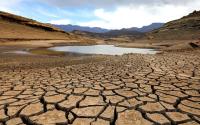6 February 2006Inside BayAreaJuliet Eilperin, Washington Post
Now that most scientists agree human activity is causing Earth to warm, the central debate has shifted to whether climate change is progressing so rapidly that, within decades, humans may be helpless to slow or reverse the trend.
This "tipping point" scenario has begun to consume many prominent researchers in the United States and abroad because the answer could determine how drastically countries need to reduce their greenhouse gas emissions in the coming years.
While scientists remain uncertain when such a point might occur, many say it is urgent that policy-makers cut global carbon dioxide emissions in half during the next 50 years or risk triggering changes that would be irreversible.
There are three specific events that these scientists describe as especially worrisome and potentially imminent, although the time frames are a matter of dispute: widespread coral bleaching that could damage the world's fisheries within three decades, dramatic sea level rise by the end of the century that would take tens of thousands of years to reverse and, within 200 years, a shutdown of the ocean current that moderates temperatures in northern Europe.
The debate has been intensifying because Earth is warming much faster than some researchers had predicted. James Hansen, who directs the National Aeronautic and Space Administration's Goddard Institute of Space Studies, last week confirmed that 2005 was the warmest year on record, surpassing 1998.
Earth's average temperature has risen nearly 1 degree Fahrenheit during the past 30 years, he noted, and an increase of about 4 degrees during the next century would "imply changes that constitute practically a different planet."
"It's not something you can adapt to," Hansen said in an interview. "We can't let it go on another 10 years like this. We've got to do something."
Princeton University geosciences and international affairs professor Michael Oppenheimer, who also advises the advocacy group Environmental Defense, said one of the greatest dangers lies in the disintegration of the Greenland or West Antarctic ice sheets, which together hold about 20 percent of the fresh water on the planet.
If either of the two sheets disintegrates, sea level could rise nearly
20 feet in the course of a couple of centuries, swamping the southern third of Florida and Manhattan up to the middle of Greenwich Village.
While the Greenland and the Antarctic ice sheets as a whole are gaining some mass in their cold interiors because of increasing snowfall, they are losing ice along their peripheries. That indicates scientists may have underestimated the rate of disintegration they face in the future, Oppenheimer said. Greenland's current net ice loss is equivalent to an annual 0.008-inch rise in sea level.
The effects of the collapse of either ice sheet would be "huge," Oppenheimer said.
Last year the British government sponsored a scientific symposium on "Avoiding Dangerous Climate Change" that examined a number of possible tipping points. A book based on that conference, due to be published Tuesday, suggests that disintegration of the two ice sheets becomes more likely if average temperatures rise by more than 5 degrees Fahrenheit.
The report concludes that a temperature rise of just 1.8 degrees Fahrenheit is likely to lead to extensive coral bleaching, destroying critical fish nurseries in the Caribbean and Southeast Asia.
David Warrilow, who heads science policy on climate change for Britain's Department of Environment, Food and Rural Affairs, said that while the science remains unsettled, his government has decided to take a precautionary approach. He compared consuming massive amounts of fossil fuels to the strategy of the Titanic's crew, who were unable to avoid an iceberg because they were speeding across the Atlantic in hopes of breaking a record.
"We know there are icebergs out there, but at the moment we're accelerating toward the tipping point," Warrilow said in an interview. "This is silly. We should be doing the opposite, slowing down whilst we build up our knowledge base."
The Bush administration espouses a different approach. Marburger said that while everyone agrees carbon dioxide emissions should decline, the United States prefers to promote cleaner technology rather than impose mandatory greenhouse gas limits.
"The U.S. is the world leader in doing something on climate change because of its actions on changing technology," he said.






